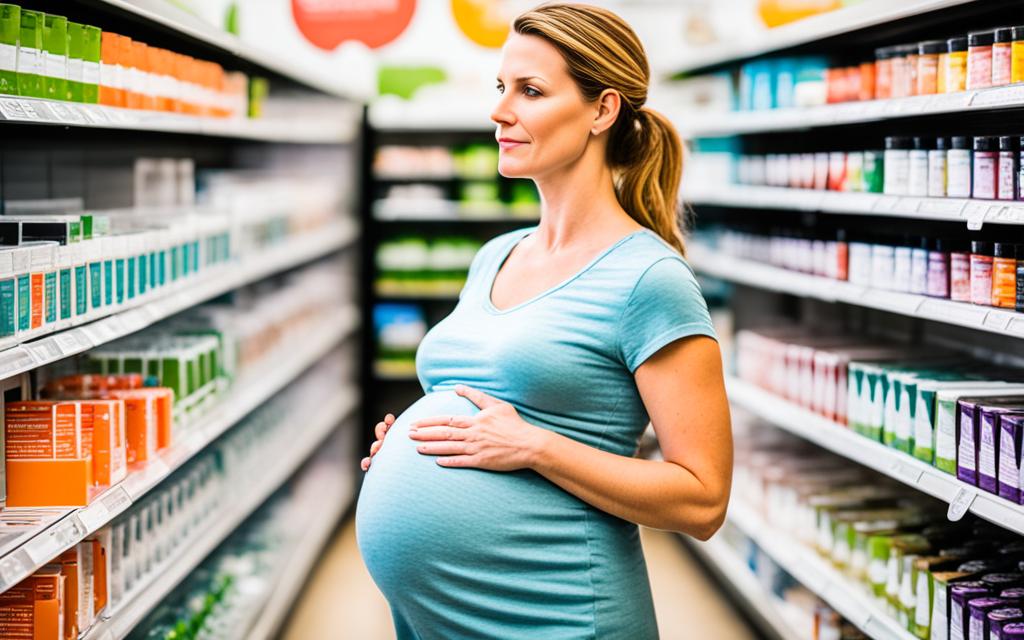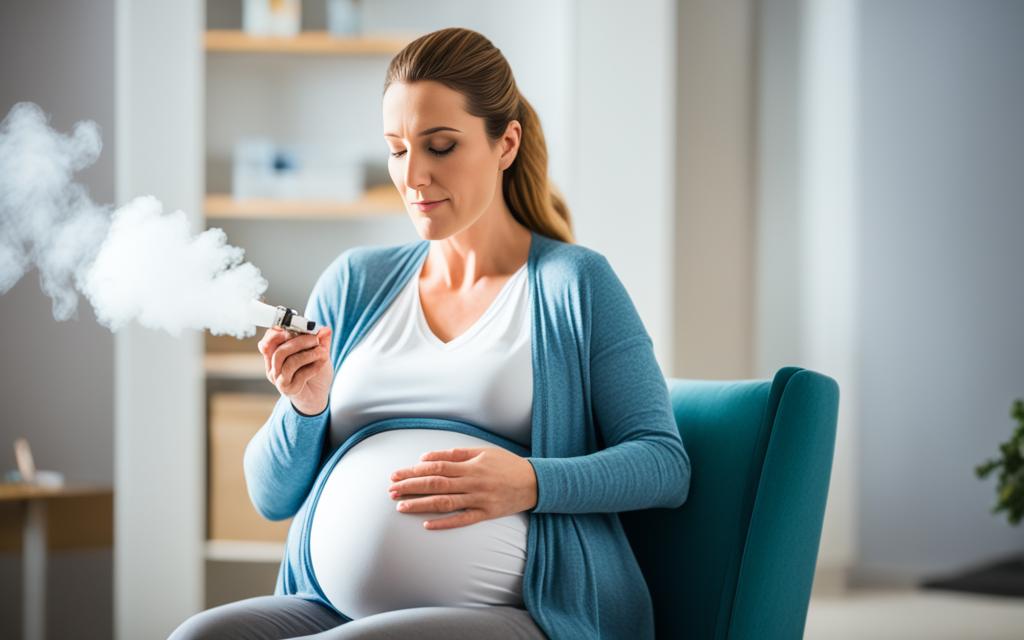In this section, we will explore the complexities of vaping during pregnancy and share personal accounts of individuals who vaped while pregnant and had healthy babies. We will discuss the concept of harm reduction choices and how vaping can be considered as a potential alternative to smoking during pregnancy.
Key Takeaways
- Vaping during pregnancy is a topic that raises questions and concerns.
- Some individuals who vaped while pregnant have reported having healthy babies.
- Harm reduction choices, such as vaping, can be considered as alternatives to traditional cigarette smoking during pregnancy.
- It is important to weigh the risks and benefits and seek guidance from healthcare professionals before making a decision about vaping during pregnancy.
- Further research is needed to fully understand the effects of vaping on the baby during pregnancy.
The Safety of Vaping While Pregnant
When it comes to vaping while pregnant, the safety of both the mother and the developing baby is of utmost importance. To gain a comprehensive understanding of the potential risks and benefits, let’s delve into the studies and research surrounding nicotine exposure in pregnancy and evaluate the safety aspects of using electronic cigarettes as a harm reduction tool.
Evaluating Nicotine Exposure in Pregnancy
Research has shown that nicotine exposure during pregnancy can have adverse effects on fetal development, potentially leading to complications such as preterm birth, low birth weight, and increased risk of sudden infant death syndrome (SIDS). Traditional cigarette smoking, which contains numerous harmful chemicals besides nicotine, is widely recognized as a significant risk factor.
While vaping also involves nicotine exposure, e-cigarettes do not contain many of the harmful chemicals found in tobacco smoke. However, it is essential to note that the long-term effects of vaping during pregnancy are still being studied, and absolute safety cannot be guaranteed.
Weighing the Potential Risks and Benefits
As with any maternal risk reduction choice, the decision to vape while pregnant should involve careful consideration of the potential risks and benefits. On one hand, using electronic cigarettes as an alternative to smoking provides an avenue for harm reduction by eliminating exposure to many harmful chemicals found in traditional cigarettes. On the other hand, the potential adverse effects of nicotine on fetal development must be taken into account.
It’s crucial for pregnant individuals to consult with healthcare professionals to make informed decisions regarding vaping during pregnancy. Every pregnancy is unique, and personalized guidance is invaluable in weighing the risks and benefits.
Summary of Findings
| Key Points: |
|
|---|
Tobacco Harm Reduction and Maternal Smoking Alternatives
In the pursuit of a healthier pregnancy, understanding tobacco harm reduction and exploring alternative options for pregnant individuals who smoke is crucial. While quitting smoking entirely is the ideal approach, it can be an extremely challenging task. Therefore, it becomes essential to assess whether there are safer alternatives available, such as vaping, to mitigate the potential risks associated with traditional cigarette smoking.
Maternal smoking alternatives aim to provide pregnant individuals with harm reduction choices that can help them reduce or eliminate their exposure to harmful substances found in tobacco smoke. These alternatives can offer a way to satisfy nicotine cravings while minimizing the adverse health effects.
One popular maternal smoking alternative that has gained attention is vaping. Vaping involves inhaling and exhaling aerosol produced by an electronic cigarette or similar device. These devices are designed to simulate the sensation of smoking, delivering nicotine without the combustion and harmful byproducts associated with traditional cigarettes.
“Vaping has emerged as a potential harm reduction tool for pregnant individuals who find it challenging to quit smoking entirely,” says Dr. Jane Thompson, a leading expert in maternal and fetal health.
“With vaping, pregnant individuals can potentially reduce their exposure to harmful chemicals present in tobacco smoke, including tar and carbon monoxide,” adds Dr. Thompson.
However, it is important to note that while vaping offers the potential for harm reduction, it is not without risks. The safety and long-term effects of vaping on both the pregnant individual and the developing baby are still subjects of ongoing scientific research. It is crucial for pregnant individuals to consult with healthcare professionals to make an informed decision about whether vaping is a suitable alternative for them.
Examining the Potential Effects
To gain a comprehensive understanding of tobacco harm reduction and vaping as a maternal smoking alternative, it is essential to examine the potential effects on both the pregnant individual and the developing baby. Let’s explore some key aspects:
| Aspect | Effects on Pregnant Individuals | Effects on Developing Babies |
|---|---|---|
| Nicotine Exposure | May reduce exposure to harmful chemicals found in tobacco smoke | Exposure to nicotine, which can affect brain development |
| Secondhand Vaping | May expose non-smoking individuals to potentially harmful aerosol | Unknown potential risks and effects |
| Other Chemicals | Reduction in exposure to various harmful substances present in tobacco smoke | Potential reduction in exposure to harmful chemicals compared to traditional cigarette smoking |
It is important to recognize that while vaping may reduce certain risks associated with smoking during pregnancy, it does not eliminate them entirely. Pregnant individuals should carefully consider the available alternatives, weigh the potential benefits and risks, and make an informed decision.
Seeking Expert Guidance
Expert opinions play a crucial role in shaping our understanding of tobacco harm reduction and maternal smoking alternatives. Leading healthcare professionals and regulatory bodies provide invaluable insights based on current scientific evidence and clinical experience.
“While there is ongoing debate about the safety and efficacy of vaping during pregnancy, it is imperative for pregnant individuals to consult with their healthcare providers,” advises Dr. Sarah Johnson, a renowned obstetrician-gynecologist.
By seeking expert guidance, pregnant individuals can receive personalized advice tailored to their specific circumstances, ensuring a comprehensive evaluation of the potential risks and benefits.
In the next section, we will explore in more detail the potential effects of vaping on the developing baby during pregnancy. Through an examination of existing research and scientific studies, we can gain further insights into the impact of vaping on fetal health.
Understanding the Effects of Vaping on the Baby
In this section, we will delve into the potential effects of vaping on the baby during pregnancy. It is crucial to understand the health risks associated with smoking while pregnant and the use of vaping as an alternative. By analyzing existing research and examining reported effects, we can gain valuable insights into the impact of vaping on the developing baby.
Smoking while pregnant has long been known to pose significant health risks for both the pregnant individual and the baby. The harmful chemicals present in cigarettes can lead to complications such as low birth weight, premature birth, and an increased risk of various health conditions.
When it comes to vaping, however, the research is still evolving. While electronic cigarettes do not contain tobacco, they do contain nicotine, which is a known addictive substance. Nicotine exposure during pregnancy can have detrimental effects on fetal development and may potentially lead to long-term health issues.
“It is crucial to understand the health risks associated with smoking while pregnant and the use of vaping as an alternative.”
Existing studies have indicated that nicotine exposure from vaping can have negative effects on fetal brain development. However, it is important to note that the long-term impact of vaping on babies is still not fully understood, as this is a relatively new phenomenon.
While some individuals may argue that vaping is a safer alternative to smoking during pregnancy, it is essential to prioritize the health and well-being of both the pregnant individual and the developing baby. Seeking guidance from healthcare professionals and making informed decisions is vital.
Further research is needed to fully comprehend the effects of vaping on the baby during pregnancy. By staying informed and evaluating the risks and benefits, pregnant individuals can make educated choices regarding their reproductive health.
Personal Experiences: Vaping While Pregnant
In this section, we will delve into the personal experiences of individuals who made the choice to vape while pregnant and have since had healthy babies. These firsthand accounts provide valuable insights into the decision-making process, precautionary measures taken, and the overall outcomes of their vaping journey during pregnancy.
“I vaped while pregnant, and my baby is fine,” shared Sarah, a mother of two. “After struggling for years to quit smoking, I decided to try vaping as a harm reduction option. With guidance from my healthcare provider, I gradually reduced my nicotine intake and monitored my baby’s health regularly. I’m relieved to say that my baby boy was born healthy and has had no issues so far.”
While Sarah’s story is just one example, there are numerous accounts of pregnant individuals who have successfully used vaping as an alternative to smoking and had positive outcomes for both themselves and their babies. These individuals often approached vaping as a harm reduction choice, aiming to minimize the potential harm caused by traditional cigarette smoking.
It is important to note that each person’s experience may vary, and the decision to vape while pregnant should be made in consultation with healthcare professionals. Their expertise and advice can help individuals understand the potential risks and benefits specific to their situation and ensure the health and well-being of both the mother and the unborn baby.
Precautions and Monitoring
Pregnant individuals who choose to vape typically take several precautions to minimize potential risks. These may include:
- Choosing e-liquids with low or no nicotine content
- Opting for vaping devices that produce less harmful chemicals
- Monitoring their baby’s growth and development through regular check-ups with healthcare professionals
- Discussing their vaping habits openly with their obstetrician or midwife
By diligently following these precautions and actively monitoring their health, pregnant individuals can take an informed approach to harm reduction and make choices that prioritize the well-being of their baby.
The Importance of Individualized Approach
Every pregnancy is unique, and what works for one person may not work for another. The decision to vape while pregnant should consider individual circumstances, medical history, and expert guidance. It is crucial to consult healthcare professionals who specialize in prenatal care to ensure an appropriate and personalized approach to harm reduction.
Remember, while personal experiences can provide valuable insights and perspectives, they should not replace professional medical advice. Pregnant individuals are encouraged to have open and honest conversations with their healthcare providers as they navigate their journey towards a smoke-free and healthy pregnancy.
Weighing the Risks and Benefits
In order to make an informed decision about vaping during pregnancy, it’s important for pregnant individuals to weigh the risks and benefits. This involves examining existing research, considering personal experiences, and seeking expert opinions. By doing so, individuals can better understand the factors that should influence their decision about whether to vape while pregnant.
Research-Based Insights
Existing research plays a pivotal role in understanding the safety of vaping during pregnancy. While studies on this subject are still limited, they provide valuable insights into the potential risks and benefits. It’s important to note that some research suggests potential adverse effects of nicotine exposure on fetal development. However, compared to traditional smoking, vaping has been found to reduce exposure to harmful chemicals and toxins associated with combustible tobacco products.
| Risks | Benefits |
|---|---|
| – Potential nicotine exposure | – Potential harm reduction compared to smoking |
| – Limited research on long-term effects | – Reduced exposure to harmful chemicals |
| – Uncertainty about impact on fetal development | – Helps overcome traditional smoking habits |
| – Lack of regulatory oversight | – Lower risk of secondhand smoke exposure |
It’s crucial for pregnant individuals to consult with their healthcare provider about the potential risks and benefits of vaping during pregnancy. This will ensure that they receive personalized guidance based on their specific circumstances and medical history.
Personal Experiences Matter
While research provides valuable insights, personal experiences can also play a significant role in decision-making. Hearing from individuals who have vaped while pregnant and had healthy babies can offer a different perspective. These firsthand accounts can provide reassurance and share valuable insights into the precautions taken and outcomes experienced.
“I chose vaping as a harm reduction choice during my pregnancy, and my baby turned out healthy. It helped me quit smoking and reduce my exposure to harmful chemicals. However, every individual’s experience is unique, and I strongly recommend consulting with your healthcare provider.”
Expert Opinions
Seeking the perspectives of experts is crucial when considering the safety of vaping while pregnant. Consulting with healthcare professionals, such as obstetricians and gynecologists, can provide reliable guidance tailored to the individual’s specific situation. Additionally, understanding the latest guidelines from organizations like the American College of Obstetricians and Gynecologists (ACOG) can help individuals make well-informed decisions.
Dr. Amanda Thompson, an OB-GYN specialist, shares her opinion:
“While the long-term effects of vaping during pregnancy are still uncertain, it’s important to recognize that using electronic cigarettes may be a harm reduction choice for some individuals. However, it’s crucial to balance the potential benefits with the known risks and work closely with your healthcare provider to make the best decision for yourself and your baby.”
The insights from both personal experiences and expert opinions demonstrate the complexity of the risks and benefits associated with vaping during pregnancy. Ultimately, the decision should be made with careful consideration, in consultation with healthcare professionals, and based on the available evidence.
Expert Opinions on Vaping During Pregnancy
In this section, we will explore the viewpoints of experts in the field regarding the use of electronic cigarettes during pregnancy. It is crucial to consider the latest guidelines from medical professionals and regulatory bodies to gain a comprehensive understanding of the safety of vaping while pregnant.
“The safety of electronic cigarette use during pregnancy is a contentious issue that requires careful evaluation. While vaping may appear to be a harm reduction tool for individuals who smoke, it is important to note that the long-term effects of e-cigarette use on the developing fetus are not well-understood.” – Dr. Emily Jackson, Obstetrician
According to Dr. Jackson, the safety of using electronic cigarettes during pregnancy is uncertain. While vaping may offer harm reduction benefits for individuals who smoke, the potential risks to the developing fetus need to be considered. It is essential to consult with healthcare professionals for personalized guidance based on individual circumstances.
- Lack of Research: The limited research available on the safety of vaping while pregnant makes it challenging to draw definitive conclusions. Further studies are needed to understand the potential risks and benefits associated with electronic cigarette use during pregnancy.
- Nicotine Exposure: One of the primary concerns regarding vaping during pregnancy is the exposure to nicotine. Nicotine is known to have adverse effects on fetal development, and its potential impact on the developing baby needs careful consideration.
- Alternatives and Support: While vaping might be considered by some as a harm reduction option, it is essential to explore alternatives and support systems available to pregnant individuals who smoke. Nicotine replacement therapies and counseling services can provide effective support in quitting smoking.
It is crucial to note that medical professionals and regulatory bodies have varying stances on the use of electronic cigarettes during pregnancy. The decision to vape while pregnant should be made after taking into account the latest research, individual health circumstances, and guidance from healthcare providers.
| Safety of Vaping While Pregnant | |
|---|---|
| Advantages |
|
| Concerns |
|
It is important to have open and honest discussions with healthcare professionals about the use of electronic cigarettes during pregnancy. Healthcare providers can provide personalized advice and support for pregnant individuals who are considering vaping as a harm reduction strategy.

Misconceptions and Common Myths
During pregnancy, there are various misconceptions and myths surrounding the safety of vaping, leading to confusion and uncertainty among expectant individuals. It is crucial to address these misconceptions and provide accurate information to support informed decision-making. Let’s debunk some common myths related to vaping during pregnancy:
Myth #1: Vaping is as Harmful as Smoking
Contrary to this belief, vaping is generally considered less harmful than traditional cigarette smoking. While it’s always best to avoid nicotine and substances during pregnancy, studies suggest that vaping may be a harm reduction choice for individuals who are unable to quit smoking completely.
Myth #2: Vaping is Safe for Pregnant Women
Although vaping may carry fewer risks than smoking, it’s essential to recognize that electronic cigarettes still contain potentially harmful substances. While there is limited research on the specific effects of vaping during pregnancy, it is advisable to exercise caution and explore other harm reduction choices.
Myth #3: Vaping Helps with Quitting Smoking
While some individuals may find vaping helpful in reducing or quitting smoking, it is not a guaranteed method for smoking cessation. Pregnant individuals who are looking to quit smoking should consult healthcare professionals to explore evidence-based smoking cessation approaches that prioritize the safety of both the expectant individual and the developing baby.
“It’s important to differentiate between harm reduction choices and completely risk-free options. Consult healthcare professionals for personalized guidance.”
Myth #4: Second-Hand Vapor is Harmless
Second-hand vapor from electronic cigarettes may contain potentially harmful substances, including nicotine and other chemicals. It is important to be mindful of the potential risks to others, especially infants and children, who may be more vulnerable to the effects of second-hand exposure.
Myth #5: Vaping has No Impact on the Baby
Research regarding the specific effects of vaping on the developing baby is limited. However, it is prudent to avoid any potential risks by opting for nicotine-free alternatives or exploring non-vaping harm reduction choices.
Myth #6: All Vape Products are Safe
Not all vape products are created equal. The safety and quality of electronic cigarettes vary, and some products may contain harmful ingredients or malfunction. It is crucial to choose reputable brands and seek guidance from healthcare professionals before making any vaping-related decisions during pregnancy.
Myth #7: Vaping is a Risk-Free Alternative
While harm reduction choices like vaping may offer a potential reduction in risks compared to smoking, it is important to remember that no nicotine consumption is entirely risk-free during pregnancy. The long-term effects of vaping are still not fully understood, and other harm reduction choices should be considered.
In summary, separating fact from fiction is vital when considering the safety of vaping during pregnancy. While harm reduction choices are a consideration, it is crucial to consult healthcare professionals for personalized guidance and explore alternative, evidence-based options that prioritize the well-being of both the expectant individual and the baby.
Considering Other Alternatives
For pregnant individuals who are looking to quit smoking or reduce harm, there are various alternatives available. In addition to vaping, other nicotine replacement therapies can be considered as effective options. These alternatives provide pregnant individuals with choices that can aid them in achieving their goal of a smoke-free pregnancy while minimizing potential risks. Here are a few alternatives worth exploring:
Nicotine Replacement Therapies (NRT)
NRTs, such as nicotine gum, patches, and lozenges, offer a regulated and controlled mechanism for delivering nicotine to the body without the harmful toxins found in cigarette smoke. These products have been widely recognized as effective tools for quitting smoking or reducing tobacco consumption among the general population. Pregnant individuals can consult with healthcare professionals to determine the most suitable NRT option and dosage for their specific needs.
Behavioral Support Programs
Behavioral support programs complement nicotine replacement therapies and can provide pregnant individuals with the necessary tools and guidance to quit smoking successfully. These programs may include counseling, group support, and educational resources aimed at addressing the psychological and emotional aspects of nicotine addiction. Participating in a behavioral support program enhances the chances of achieving a smoke-free pregnancy.
“I found tremendous support through a behavioral support program. It helped me understand and address the underlying triggers of my smoking habit. Combined with nicotine replacement therapies, I was able to quit smoking during my pregnancy and create a healthier environment for my baby.” – Sarah, mother of one
Each pregnant individual’s journey is unique, and what works for one may not work for another. Seeking guidance from healthcare professionals, such as obstetricians or midwives, is crucial when considering alternatives to smoking. These professionals can provide personalized advice based on individual circumstances and medical history.
It’s important to remember that quitting smoking or reducing harm is an ongoing process that requires dedication, support, and the right resources. While vaping may be one option worth exploring, other alternatives, such as nicotine replacement therapies and behavioral support programs, can provide pregnant individuals with additional choices and support systems to achieve their goal of a smoke-free pregnancy.

Comparing Maternal Smoking Alternatives
| Alternative | Benefits | Risks | Effectiveness |
|---|---|---|---|
| Nicotine Replacement Therapies (NRTs) | – Regulated nicotine delivery – Reduced exposure to harmful toxins – Nicotine withdrawal management |
– Potential nicotine dependence – Side effects (e.g., headaches, nausea) – Inadequate dosage adjustment |
High, with proper guidance and support |
| Vaping | – Potential harm reduction compared to smoking – Variety of flavors and options – Ease of use |
– Limited long-term research on safety – Uncertainty about potential risks – Potential exposure to harmful chemicals |
Varies and may depend on individual preference |
| Behavioral Support Programs | – Psychological and emotional support – Addressing underlying triggers and habits – Enhanced chances of quitting |
– Limited availability in some areas – Requires commitment and active participation |
High, with proper engagement and individual commitment |
Note: The effectiveness of alternatives may vary for individuals, and it’s important to consult with healthcare professionals for personalized advice and support throughout the journey of quitting smoking or reducing harm during pregnancy.
Conclusion
In conclusion, while further research is needed, personal accounts and existing evidence suggest that some individuals who vaped while pregnant had healthy babies. It is essential for pregnant individuals to weigh the risks and benefits, considering harm reduction choices and seeking guidance from healthcare professionals. Ultimately, the decision to vape during pregnancy should be made with careful consideration and informed judgment.
FAQ
Can vaping during pregnancy harm my baby?
While research on the effects of vaping during pregnancy is limited, existing evidence suggests that it may pose potential risks to the developing baby. Nicotine exposure through vaping can affect fetal development and may contribute to long-term health issues. It is important to consult with healthcare professionals for guidance on harm reduction choices.
Is vaping a safer alternative to smoking during pregnancy?
Vaping is often marketed as a tobacco harm reduction tool, but its safety during pregnancy is still being studied. While it may be a potentially safer option than smoking traditional cigarettes due to the absence of tobacco combustion, the long-term effects of vaping on pregnancy outcomes are not yet fully understood. It is essential for pregnant individuals to consider other alternatives and seek guidance from healthcare professionals.
Are there any known effects of vaping on the baby?
The effects of vaping on the developing baby are not yet fully known. Studies suggest that nicotine exposure through vaping during pregnancy may increase the risk of preterm birth, low birth weight, and developmental issues. The inhalation of harmful chemicals and substances present in e-cigarette aerosols may also impact fetal health. It is crucial to prioritize your baby’s well-being and explore safer alternatives if considering harm reduction during pregnancy.
What are some personal experiences of individuals who vaped while pregnant?
Personal experiences vary, but some individuals claim to have vaped while pregnant and had healthy babies. These experiences should not be taken as scientific evidence, but rather as anecdotal accounts. It is important to note that the long-term effects of vaping on the health and development of the baby are still unknown. Pregnant individuals should carefully consider the potential risks and benefits and consult with healthcare professionals.
What should I consider when weighing the risks and benefits of vaping during pregnancy?
When considering vaping during pregnancy, it is crucial to evaluate the potential risks to the baby’s health, such as nicotine exposure and the inhalation of harmful substances. It is equally important to weigh these risks against the potential benefits of harm reduction. However, research on the safety and effectiveness of vaping as a smoking alternative during pregnancy is still limited. Consulting with healthcare professionals can provide valuable guidance in making an informed decision.
What do experts say about vaping during pregnancy?
Experts have differing opinions on the use of electronic cigarettes during pregnancy. Many medical professionals and regulatory bodies, such as the American College of Obstetricians and Gynecologists, advise against vaping due to the potential risks associated with nicotine exposure and the lack of comprehensive research. It is best to consult with healthcare professionals for guidance tailored to your specific situation.
What are some common misconceptions about vaping during pregnancy?
Some common misconceptions include the belief that vaping is entirely safe and harmless during pregnancy. However, evidence suggests that vaping can expose the fetus to nicotine and other potentially harmful substances. It is important to distinguish between fact and fiction when it comes to the risks and benefits of vaping during pregnancy and rely on accurate and evidence-based information to make informed decisions.
What are some other alternatives to consider if I want to quit smoking while pregnant?
There are various alternatives available to pregnant individuals looking to quit smoking or reduce harm. Nicotine replacement therapies, such as gums, patches, and lozenges, can be considered under the guidance of healthcare professionals. Additionally, support systems like counseling, behavioral interventions, and support groups can prove beneficial. It is vital to explore all available options and seek professional help for a smoke-free pregnancy.
Is it safe to vape while breastfeeding?
The safety of vaping while breastfeeding is still unclear due to limited research. Similar to pregnancy, the potential risks associated with nicotine exposure and the inhalation of harmful substances should be considered. It is advisable to consult with healthcare professionals for personalized advice on harm reduction choices during the breastfeeding period.








